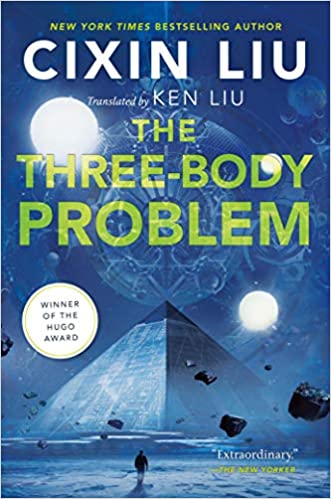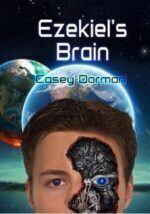
Award winning Chinese science fiction author Cixin Liu has said, “Science fiction is a literature that belongs to all humankind. It portrays events of interest to all humanity, and thus science fiction should be the literary genre most accessible to readers of different nations.” I think this is true, or at least it can be. For science fiction to appeal to everyone on the planet it is necessary that its stories portray situations that are relevant to everyone, that they are written about in a way that doesn’t exclude those whose cultural or societal beliefs fall into one political camp or another, and, most of all, it requires a literate world in which everyone has enough of their basic needs met that they have time for leisure reading.
We are a long way from the ideal state described above, but some books are a movement toward it. Cixin Liu’s “The Three-Body Problem “represents a step in that direction. Liu lives in the People’s Republic of China. When I think of science fiction audiences, China doesn’t come immediately to mind, but that is because of my ignorance, not reality. “The Three-Body Problem” not only won the Hugo Award after its translation into English in 2014, but it also won China’s Galaxy Award for best science fiction in 2006, the year of its publication in China. Cixin Liu has won the Galaxy Award, which I didn’t even know existed, 9 times.
“The Three-Body Problem “is hard science fiction, meaning that it is literally filled with science, some of it real, much of it speculative with kernels of real science leading to wildly fantastic consequences. One of its themes is the overturning of the basic principles of modern physics, or at least the apparent overturning of them, since another theme is the deliberate undermining of belief in those principles. The underlying plot of the novel is the mutual discovery of another race in our galaxy, mutual in the sense that we discover them at the same time that they discover us.
The ideas contained in this novel are mind-boggling. What appears fanciful becomes less and less so, as more science behind it is revealed, although the science too, get stretched until everything seems fanciful, but I as a reader, was never sure if it was based on realistic science or not. That’s part of the entertaining quality of the book. The extraordinary discoveries come one after another, gradually unfolding the true plot that is determining the characters’ actions.
There are political criticisms in “The Three-Body Problem,” almost entirely of China’s Cultural Revolution of the 1960’s and 70’s. As such, they are a criticism of constraining science because of political or philosophical reasons. The author himself has made some political statements, almost entirely in favor of Chinese government policies, which have earned him enough suspicion in the U.S. that several Republican Congressmen objected when they heard that Netflix was creating a film version of his work. But modern Chinese politics are not an issue in the novel. Liu’s comments at the end of the English translation of the book make it clear that he hopes science fiction such as his can bring the world together.
A word about character development in “The Three-Body Problem.” The early portions of the book cover several years and skip from one character to another, many of them who die. Finally, the story settles down to a small set of regular characters. Some Western critics have complained that the characters are “shallow,” which may be valid when comparing the novel to many Western ones. I suspect that this reflects a difference between Western and Eastern cultures, as well as difference between science fiction as a genre (at least old-style science fiction) and other fiction genres. Our Western mindset is to attribute the causes of a person’s behavior to elements of their personality. They are adventurous, courageous, lazy, lackadaisical, psychopathic, etc. Sociological research has suggested that many Eastern cultures tend to see the causes of behavior as due to events and circumstance or even luck, rather than to ongoing personality characteristics (it is a more vs less difference, rather than an either-or difference). Liu’s novel takes the latter approach, giving a detailed description of the circumstances leading characters to do what they do in the novel. It is not a lack of depth of characters so much as it represents a different approach to character motivation that is reflective of the overall culture of the writer. In the case of “The Three-Body Problem,” this results in the novel gradually providing the basis for different characters’ otherwise puzzling behavior by providing after-the-fact stories of what happened in their lives to cause them to behave as they do.
I found this book to be absolutely intriguing and impossible to put down until I got to its end. I am eager to read the two novels that are its sequels. It is science fiction at its very best.
If you enjoy hard science fiction using a wildly imaginative plot based on real science, take a look at my most recent novel, Ezekiel’s Brain.
The Three-Body Problem is available on Amazon HERE
Ezekiel’s Brain may be purchased through Amazon by clicking HERE
Want to subscribe to Casey Dorman’s fan newsletter? Click HERE.





